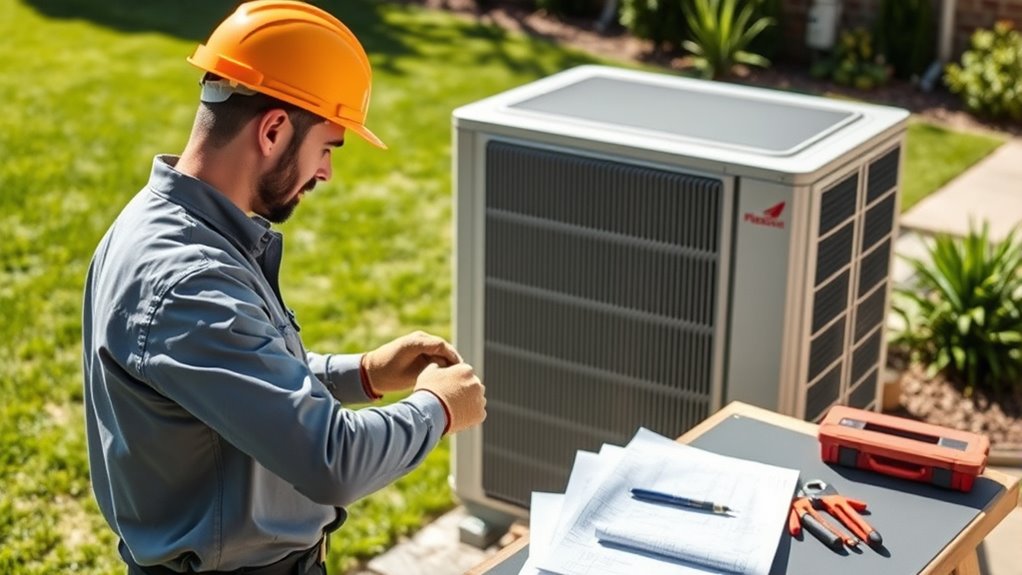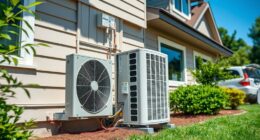To select the right contractor for heat pump installation, start by comparing detailed estimates to guarantee fair pricing and quality work. Verify their licenses, certifications, and insurance to avoid scams and safety issues. Check references and online reviews to gauge experience and reputation. Prioritize contractors familiar with local codes and regulations to ensure compliance. Remember, a qualified professional makes all the difference in a smooth, safe, and long-lasting installation—keep going to find out more.
Key Takeaways
- Compare detailed quotes to ensure fair pricing and understand all associated costs.
- Verify contractor licenses and insurance to confirm credentials and legal compliance.
- Check references and reviews to assess experience, reputation, and customer satisfaction.
- Ensure the contractor emphasizes quality installation for system efficiency and durability.
- Confirm adherence to local building codes and safety standards throughout the installation process.

Choosing the right contractor for your heat pump installation is essential to make certain the job is done efficiently and correctly. The decision can considerably impact your system’s performance, energy savings, and long-term reliability. One of the first things you should consider is how different contractors compare in terms of costs. Conducting a thorough cost comparison helps you understand what’s reasonable for your project and prevents you from overpaying or settling for subpar quality. Be wary of bids that are suspiciously low, as they might indicate shortcuts or the use of inferior materials. Instead, look for detailed estimates that break down costs for equipment, labor, and additional expenses. Remember, the cheapest option isn’t always the best; quality installation often justifies a higher price, especially when it guarantees efficiency and durability.
Licensing requirements are another critical factor in selecting a contractor. Every reputable heating and cooling professional should hold the necessary licenses and certifications mandated by your state or local authorities. These credentials ensure the contractor has met specific standards for training, knowledge, and safety. Verifying licensing requirements helps you avoid scams or unqualified workers who might cut corners, leading to costly mistakes or safety hazards down the line. You can typically check a contractor’s license status through your state’s licensing board or consumer protection agency. Don’t hesitate to ask contractors for proof of their licensing and insurance coverage; this not only protects you from liability in case of accidents but also confirms their legitimacy and professionalism.
Beyond costs and licensing, it’s wise to review the contractor’s experience with heat pump installations. Ask for references or look for reviews online to gauge their reputation. A contractor with a proven track record in handling heat pump systems will likely deliver a smoother process and better results. Additionally, ensure they offer warranties on their work and the equipment they install. This provides peace of mind that if issues arise, they will rectify them without extra charges. An understanding of local building codes and regulations is also crucial, as compliance ensures your installation is legal and safe.
Frequently Asked Questions
How Long Does a Typical Heat Pump Installation Take?
A typical heat pump installation usually takes about one to three days, depending on your home’s size and system complexity. You should consider the installation timeline when scheduling, as factors like permits or existing system removal can add time. To guarantee smooth scheduling, coordinate with your contractor ahead of time, and plan for potential delays. This helps you get your new heat pump up and running efficiently without unexpected setbacks.
What Warranties Should I Expect From a Qualified Contractor?
You should expect warranty coverage that includes at least a one-year guarantee on labor and parts, with many contractors offering extended warranties on the heat pump itself. Look for clear contractor guarantees that specify what’s covered and for how long, ensuring peace of mind. A reputable contractor will provide written warranties, demonstrating confidence in their work and the equipment, so you know you’re protected against potential issues down the line.
How Do I Verify a Contractor’s Licensing and Insurance?
They say, “Trust, but confirm.” To confirm a contractor’s licensing and insurance, check their credentials with your state licensing board or local contractor registry. Always ask for proof of insurance and contact the provider to verify coverage. This step ensures you’re protected if accidents happen. Don’t settle for less—secure your peace of mind by thoroughly verifying their credentials and insurance before any work begins.
What Maintenance Is Required After Heat Pump Installation?
After your heat pump installation, you should follow a regular maintenance schedule that includes cleaning or replacing filters every 1-3 months, checking the outdoor unit for debris, and scheduling annual system inspections. These inspections help identify potential issues early, ensuring peak efficiency and longevity. Keep an eye on unusual noises or performance drops, and contact a professional if you notice any problems to keep your heat pump running smoothly.
Are There Government Incentives for Installing a Heat Pump?
Imagine Uncle Sam waving a big check your way—sounds like a government incentive, right? You’re probably eligible for tax credits or rebates when installing a heat pump. Many government programs aim to boost energy efficiency, so it’s worth checking local and federal options. These incentives can markedly cut your costs, making your eco-friendly upgrade more affordable—so don’t miss out on those opportunities to save money while saving the planet.
Conclusion
So, now that you’re armed with the knowledge to pick the perfect heat pump contractor, go ahead—ditch the amateurs and find someone who actually knows what they’re doing. After all, it’s just your comfort and wallet on the line, no big deal. Trust your instincts, ask lots of questions, and maybe, just maybe, avoid that “expert” who claims they can install a heat pump with a magic wand. Happy heating!








